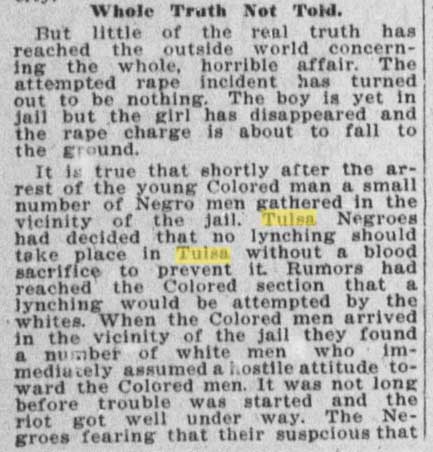As we digitize more newspapers, we can read across time for viewpoints represented across multiple newspaper titles. Access to the digitized versions of historic newspapers ensures that we will not forget and cannot hide history. In this blog post, we offer editorials and stories from three titles, discussing the Tulsa race massacre: The Dallas Express, The Houston Informer, both from June 1921, and the San Antonio Register, from February 2000.
From June 11, 1921, The Dallas Express published, “The following comments

on the Tulsa tragedy . . . worthy of note for the different sentiments expressed by their authors.” This presents editorial commentary from The Tulsa Daily World, The Dallas News, and The Dallas Times Herald, printed side-by-side, to show how different editors absorbed and discussed the events. The Express also expands upon the rape story that had sparked the riot, with the caption, “Whole Truth Not Told.”
The Houston Informer, from June 11, 1921, asks, “Where is the Old Law, Anyhow?” Delving into the dangers and consequences of ignoring law, order, and the constitution to castigate the “reign of lawlessness in this country [that] is wholly and solely responsible for the inter-racial
conflict . . .” and advocating for “respect for law and order to put an end to ruthless mob violence.”

Bernice Powell Jackson, in the February 3, 2000, issue of The San Antonio Register, explores attempts to cover up the entire history of the massacre. “The story of the Tulsa race massacre was almost lost as whites intentionally hid the truth–even that scandalous newspaper front page calling for a lynching was removed from all files and as African Americans were fearful of telling what had happened, afraid that history might repeat itself.” Jackson’s article celebrates the formation of the Tulsa Race Riot Commission and discusses the commission’s goals for supporting survivors and their descendants after this traumatic and tragic event.
Contemporaneous newspaper stories about the massacre compare it to the German invasion of Belgium during the First World War. Learning from these voices is why we preserve, digitize, and build access to newspaper histories.

